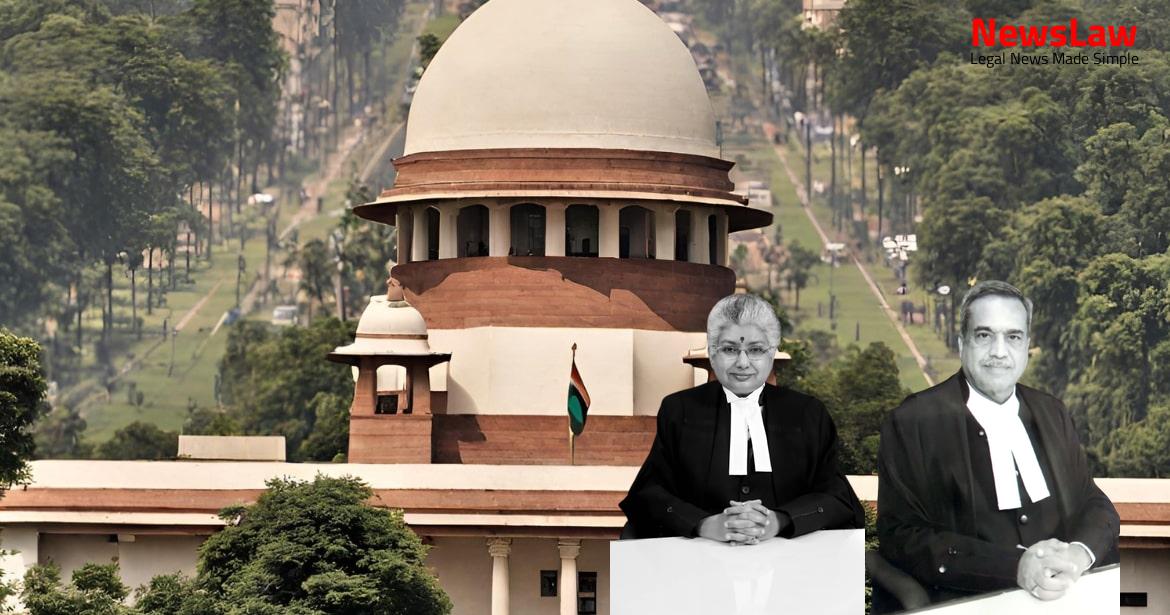Explore the detailed legal analysis conducted by the court regarding land exchange laws under the U.P. ZA & LR Act. The court’s interpretation of statutory provisions and its impact on property transactions is essential knowledge for anyone dealing with land exchanges. Stay informed on the latest legal developments in property law.
Facts
- The respondents entered into an exchange with a member of Scheduled Tribe for land.
- A mutation application was allowed based on the exchange under Section 161 of U.P. ZA & LR Act.
- The exchange was found to be in violation of the provisions as prior permission was not obtained from the Assistant Collector.
- The exchange deed was considered void as it contravened the U.P. ZA & LR Act.
- As per Section 167 of U.P. ZA & LR Act, the land transferred stands vested in the Government of Uttar Pradesh.
- The appeal against the order claiming lawful exchange was dismissed.
- It was concluded that the exchange was considered illegal under the U.P. ZA & LR Act as it involved transfer to a non-Scheduled Tribe individual.
- The High Court accepted that Section 161 of U.P. ZA & LR Act does not apply during exchange by deed.
- The High Court stated that Sections 161 and 157-B of U.P. ZA & LR Act do not apply to land exchanges made through document execution.
- High Court mentioned that stamp duty as per Indian Stamp Act Article 31 is applicable for registered exchanges.
- The High Court ruled that permission under Section 161 of U.P. ZA & LR Act was not needed for land exchanges.
- The Additional Commissioner held that exchanged lands fall under ‘agricultural lands’ and permission was not obtained, thus the exchange was deemed illegal.
Also Read: Jurisdiction of Family Court in Cases under Muslim Women’s Protection Act
Arguments
- Section 157-B does not prevent Scheduled Tribe persons from exchanging land as they are also receiving land in exchange.
- The High Court allowed the writ petition based on this interpretation.
- The appellants argued that Sections 1616 and 157-B do apply to land exchange, even if done through a registered document with proper stamp duty.
- Section 157-B prohibits Scheduled Tribe members from selling, gifting, mortgaging, or transferring land to non-Scheduled Tribe members.
- The reasoning of the High Court was deemed contrary to statutory provisions of Sections 157-B and 166 of the Act, as well as the legislative intent of the U.P. ZA & LR Act.
- The High Court was criticized for exceeding its jurisdiction by overturning previous findings in the case.
- Merely paying stamp duty does not negate the legal barriers set by Sections 157-B and 161 of the Act.
- The respondents contended that the land in question is not agricultural land and does not fall under the definition of land in Section 3(14) of the Act.
- They argued that the provisions of Chapter VIII of the Act are not applicable to the land in question.
- The respondents executed an exchange deed with Mangal Singh, a member of the Scheduled Tribe, exchanging 4 ½ Muthi of land for 12 Nali of agricultural land.
- The exchange deed mentioned that the land exchanged was not agricultural land, and possession was handed over as per the deed.
- It was argued that the ex-parte order of vesting under Section 167 of the Act without hearing the respondents was not sustainable.
- The respondents claimed that the limitation for proceedings under Section 161 mentioned in Appendix-III of the U.P. ZA & LR Act bars the proceedings in this case.
- The issue of whether the exchange deed dated 16.03.1994 violated the U.P. ZA & LR Act’s provision preventing land transfer by a member of the Scheduled Tribe was raised.
- The High Court’s stance on permission requirements under Section 161 not being a requisite condition for the land exchange was also discussed.
Also Read: Clarity on Arbitration Seat Jurisdiction
Analysis
- A bhumidhar with transferable rights may exchange land with another bhumidhar or with any Gaon Sabha or local authority with the permission of an Assistant Collector as per Section 161 of the Act.
- Under Section 157-B of the Act, members of Scheduled Tribes are restricted from transferring land to individuals not belonging to a Scheduled Tribe.
- The exchange deed executed in violation of Section 157-B of the Act is void and can be set aside.
- The definition of ‘land’ in the Act includes land held or occupied for purposes related to agriculture, horticulture, or animal husbandry.
- Section 143 empowers the Assistant Collector to make a declaration if a bhumidhar is using land for purposes not connected to agriculture, horticulture, or animal husbandry.
- Upon the grant of such a declaration, the provisions of the Act cease to apply to the bhumidhar with transferable rights for that specific land.
- The Sub-Divisional Officer/Assistant Collector can declare exchange deeds void if executed in violation of relevant sections of the Act.
- Exchange of land between respondents and Mangal Singh not mutated in official records as per U.P. ZA & LR Act
- Prohibition on exchange of land belonging to Scheduled Tribe with a non-tribal individual under Section 157-B of the Act
- Mandatory requirement of prior permission from Assistant Collector for exchange of land as per Section 161 of the Act
- Void exchange deed executed in contravention of U.P. ZA & LR Act
- No justification to consider equities when transfer is void under the Act, as per Section 167
- Significance of land to Scheduled Tribes for sustenance, social status, and economic empowerment
- Pre-requisite conditions for a valid exchange under the Act not fulfilled by the respondents
- Importance of following the provisions of U.P. ZA & LR Act for land transactions
- Consequences specified under Section 167 of the Act for void transfers
- Limitation period considerations for actions taken on void transfers under the Act
- In Chandrika Singh and others v. Raja Vishwanath Pratap Singh and another (1992) 3 SCC 90, it was held that in order to exclude the applicability of provisions of U.P. ZA & LR Act on the ground that the land is abadi land, it is necessary to determine that it is in accordance with the provisions of Sections 143 and 144 of the Act.
- It must be verified whether a declaration under Sections 143 and 144 of the Act has been made in accordance with the provisions of the Act for the exclusion of U.P. ZA & LR Act provisions for the bhumidhar with transferable rights.
- The High Court misinterpreted Section 157-B of the Act in the context of exchange by a person of Scheduled Tribe, stating that it does not prohibit such exchanges due to obtaining land in exchange.
- Section 157-B of the Act clearly bars transfer of land by a Scheduled Tribe, even by way of exchange.
- The High Court’s order goes against the express provisions of the U.P. ZA & LR Act and is not in line with its benevolent provisions.
- The judgment cannot be sustained as it contradicts the statutory provision.
- The High Court cannot override a clear statutory bar on transfer of land by Scheduled Tribes.
- Any interpretation allowing transfer would defeat the beneficial purpose of the U.P. ZA & LR Act and the constitutional aim of empowering Scheduled Tribes socially and economically.
Also Read: Land Acquisition Valuation and Development Deductions
Decision
- The appellants are given the freedom to move forward within the boundaries of the law.
- The High Court’s decision has been overturned, and the appeal has been granted.
Case Title: THE ADDITIONAL COMMISSIONER REVENUE Vs. AKHALAQ HUSSAIN . (2020 INSC 256)
Case Number: C.A. No.-007346-007346 / 2010



